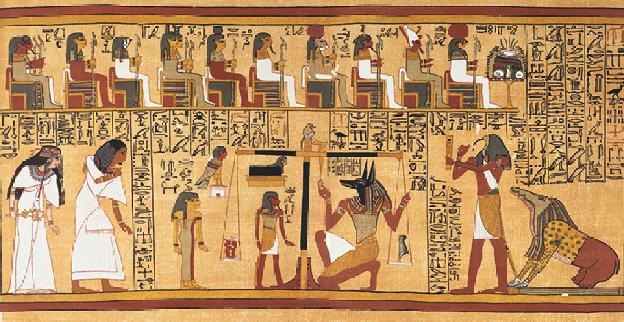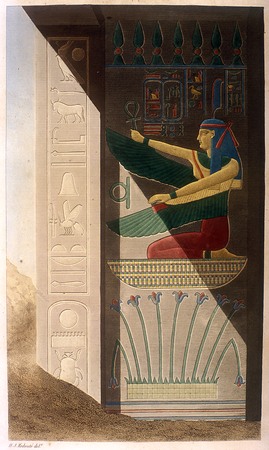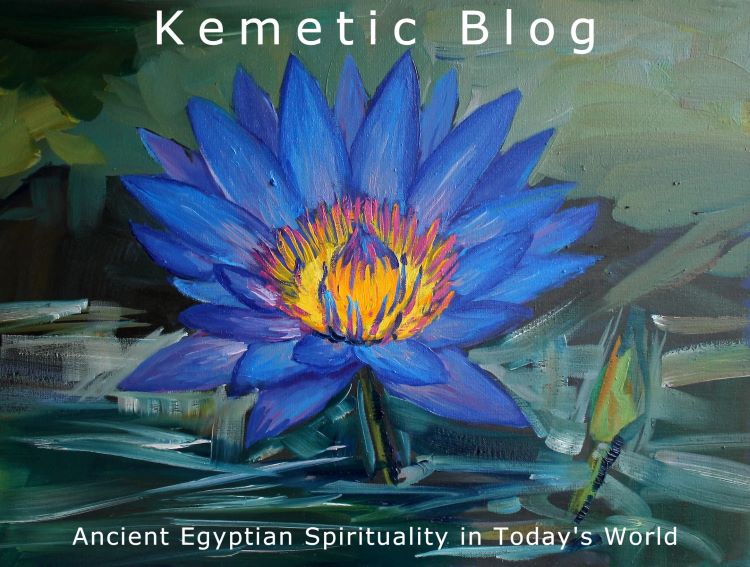
Anubis weighing the heart of Ani against a feather. This image is in the public domain. Courtesy of Wikimedia.
The 42 Positive Confessions, which may form an optional part of Kemetic practice, are an adaptation of the original 42 Negative Confessions in the Ancient Egyptian Book of the Dead. One very good example can be found in the Papyrus of Ani.
The aim of using adaptations is to make the confessions more relevant in today’s world (for example, most of us today don’t need to worry about stealing grain, although we certainly do have other issues to contend with, such as remaining balanced in mind, body and spirit in an often chaotic world). Adaptations are not a new concept. The Fellowship of Isis published their own adaptation of the confessions in 1995, known as The 42 Ideals of Ma’at. According to founder Loreon Vigne, “the ideals are meant as guidelines to actions in everyday life” and do not replace the Negative Confessions made by the soul after death.
Right and wrong-doing in the context of living a more spiritual life is just as much a concern today, as it was in ancient times. In response to changing needs and changing times, The 42 Positive Confessions serve to encapsulate the current Kemetic climate and affirm the moral code we wish to achieve as practitioners. These confessions are made as declarations to ourselves, to others, to our pantheon of gods and goddesses, the universe and so on, according to our own belief systems. It should be noted, that some Kemetic practitioners don’t believe in the gods at all, yet still believe in the philosophy of Ma’at. Most Kemetics, however, are polytheistic in their belief.
My own Kemetic practice includes reciting a self-written version of The 42 Positive Confessions. Positive confessions are intended to prompt positive action, to guide in decision-making, and to encourage correct conduct in everyday life. The 42 Positive Confessions purify and strengthen my consciousness and thus, my souls’ energetic integrity and vibration. This contributes to a state of wa’ab or spiritual cleanliness (which is a slight deviation from the original meaning of wa’ab, which was to achieve ritual purity and readiness to enter a temple or engage in ritual work; this was achieved by cleansing the hands with water). The ultimate goal is further evolution and growth as a human being. This, in turn, shapes my reality and influences the reality around me. As a devotional offering, The 42 Positive Confessions effectively strengthens the bond with the deities I work with — chiefly among them, Isis — and further energises Ma’at, both as a concept and as a living being. These are my own personal beliefs regarding my Kemetic practice.
As Kemetics, I think we need to decisively hit the nail on the head in terms of who we are and what we do, to withstand academic scrutiny from above and nay-sayers from below. We’re fighting for relevance; therefore, you have to back yourself up! The value and importance of working with authentic sources of information in the reconstruction and revival of ancient Egyptian religion was covered in part 2 of my book review of Profane Egyptologists by Paul Harrison. This post may be considered at least in part, a response to the call for authenticity in Kemetic paganism. Let’s go back to the source. As any reasonable person can see, a modern adaptation of the confessions is necessary to reflect the current standards and conditions in which we are living. Otherwise, the confessions may lose some of their original relevance and meaning.
The source from antiquity used in the formulation of The 42 Positive Confessions in this post is, The Papyrus of Ani which is an individual copy of The Book of Going Forth by Day, or The Book of Emerging Forth into the Light (popularly known today as, The Ancient Egyptian Book of the Dead). This manuscript was compiled in honour of Ani, a scribe from the city of Thebes, in approximately 1250 BC. It contains declarations and spells used to assist Ani in navigating the Duat, or afterlife. It also includes The 42 Negative Confessions, which were to be declared to the 42 gods of the 42 nomes, or territories of ancient Egypt upon death. The manuscript was acquired by E. A. Wallis Budge in 1888 and can be found today in the British Museum.
A theory taking hold in both Egyptology and Kemetic paganism states that shamanic wisdom permeated ancient Egyptian religion, maintaining that information found in The Ancient Egyptian Book of the Dead also applied to the living, who had prior knowledge of its mysteries before death and explored at least some of those mysteries in life (see the 2004 book, Shamanic Wisdom in the Pyramid Texts by Jeremy Naydler). The fact that some Kemetics are adapting the confessions to daily modern life, may lend some credibility to these claims. Of course, the theory is rejected by some in favour of the status quo — that’s fine.
How to Write your own 42 Positive Confessions
In the course of your Kemetic practice, you can recite the original 42 Negative Confessions as a devotional offering if you wish, or you can use a positive adaptation. To my knowledge, there is no direct evidence the ancient Egyptians engaged in either of these two practices. That doesn’t mean they did not, in some form, offer similar devotions.
If you feel so inclined, you can personalise your experience and write your own 42 Positive Confessions. If you choose to write your own set of confessions, refer to the original 42 Negative Confessions found in the Papyrus of Ani below. Reflect for a moment on each confession and re-formulate it to express its living essence of Ma’at in modern times. You may find that your confessions change and evolve over time. There’s nothing wrong with that. Writing your own 42 Positive Confessions can be a satisfying way of cultivating a more intimate relationship with the divine.
The 42 Negative Confessions from the Papyrus of Ani:
- I have not done wrong.
- I have not robbed.
- I have not stolen.
- I have not slain people.
- I have not destroyed the food offerings.
- I have not reduced measures.
- I have not stolen the property of the gods.
- I have not told lies.
- I have not stolen food.
- I have not uttered curses.
- I have not fornicated with the fornicator.
- I have not caused (anyone) to weep.
- I have not eaten the heart [i.e., I have not grieved uselessly].
- I have not attacked anyone.
- I am not a person of deceit.
- I have not robbed a parcel of land.
- I have not discussed (secrets).
- I have slandered no one.
- I have not been angry without just cause.
- I have not had intercourse with a married woman.
- I have not had intercourse with a married woman (repeats the previous affirmation but addressed to a different god).
- I have not polluted myself.
- I have terrorized none.
- I have not transgressed the Law.
- I have not been wroth.
- I have not shut my ears to the words of truth.
- I have not blasphemed or cursed.
- I am not a person of violence.
- I am not a stirrer-up of strife (or a disturber of the peace).
- I have not acted (or judged) with undue haste.
- I have not pried into matters.
- I have not multiplied my words in speaking.
- I have wronged none, I have done no evil.
- I have not worked witchcraft against the King (or blasphemed against the King).
- I have never stopped the flow of water.
- I have never raised my voice (spoken arrogantly, or in anger).
- I have not cursed or blasphemed a god.
- I have not acted with evil rage.
- I have not stolen the bread of the gods.
- I have not carried away the khenfu cakes from the spirits of the blessed dead.
- I have not snatched away the bread of the child, nor treated with contempt the god of my city.
- I have not slain the cattle belonging to the god.

The goddess, Ma’at. Image © Tresea Dutertre.
Here is my own version of The 42 Positive Confessions, or The 42 Commitments of a Kemetic Practitioner
You are free to use the commitments below, as long as you attribute credit and a link back to me, Scott Rose at KemeticBlog.com.
As mentioned previously, in The Ancient Egyptian Book of the Dead, each confession was declared to a different god. In my own version, I have chosen to commit everything to Ma’at herself, and to Isis. Isis came to me during a very low point in my life, which I have related here at Kemetic Blog. Her belief in me is has not gone un-noticed nor un-reciprocated and I feel a strong sense of personal responsibility to never let her down. As such, I affirm to the goddess, Ma’at herself and to Isis; my mother goddess, guardian and guide:
- I honour the Spirit of Ma’at; the Divine Will of Order through universal Love.
- I do good in the world; I am a source of positive action in the universe.
- I am of service to the well-being of all.
- I seek to right my wrongs; to make amends and learn my life lessons.
- I honour the sacredness of all life.
- I am generous and act with kindness.
- I conduct myself with integrity.
- I speak my truth, while honouring the truth of others.
- I am open to my own inner wisdom.
- I am considerate of my speech, for I know my thoughts and words have heka and the power to manifest.
- I form relationships that are healthy for all parties involved, including myself.
- I am honest, loyal and faithful.
- My heart is strong and light; my heart is forgiving. I have compassion for myself and others.
- I am a safe, trustworthy person.
- I am transparent in all my dealings; I maintain appropriate boundaries, while being open-minded and light-hearted.
- I care for the Earth and all the creatures who dwell upon the land, sea and air; always seeking to minimise my environmental impact and maintain a sustainable lifestyle.
- I am a good listener and a good friend.
- I am mindful of what I say to others and about others.
- I channel my anger in constructive ways.
- My sexual expressions are made with mutual respect, fidelity and love.
- I dispatch earthly cravings in a healthy manner and indulge with moderation.
- I have self-control and self-respect.
- I honour myself and others.
- I respect the laws of the land in which I live.
- My light and shadow are in balance; therefore, I am in balance.
- I consider opposing ideas.
- I am peaceful and advocate for peaceful solutions.
- I am humble regarding my achievements; always promoting equality and inclusiveness.
- I instil cooperation in all my dealings.
- I accept people for who they are, on their own terms.
- I seek to bring out the good in others.
- I aim to uplift and spread joy, with simplicity.
- I harbour goodwill toward others and maintain my own conscious vibration.
- I display leadership in my community, setting a good example for others to follow.
- I honour the native lands, landholders and the waterways.
- I use my voice for the good of the community.
- I honour the gods, goddesses, guardians and guides and I speak their names with reverence; I apologise for any blasphemies and seek to correct them.
- I accept my responsibilities and I protect those who cannot protect themselves.
- I make time for the gods, and I bring them offerings.
- I honour the souls of the dead (optional: and I show them the way, if they are lost).
- I choose order over chaos, and I use my abilities for the good of all.
- I remember who I am; and I honour the Great Oneness, the source from which we all come.
A background in New Age Spirituality has informed the writing-style of my own version of the 42 Positive Confessions. Influences from authors such as Melody, Diane Stein, Barbara Marciniak, James Redfield, Rhonda Byrne and perhaps others, who have all shaped my worldview. New Age thought is often assigned with a negative connotation by today’s society and carries with it, a stigma. That’s all the more reason you should investigate these authors for yourself and formulate your own opinion. I believe the authors above express Isian ideals.
Your own style of devotion may be totally different from mine, yet still express Ma’at perfectly. That’s a good thing! Kemeticism should be a rich tapestry of consciousness with a common goal in mind: upholding Ma’at. That is, divine order, justice, truth, freedom, respect, right-action and love. It is for this reason that I advocate for a degree of eclecticism in Kemetic pagan practice. We cannot have the aforementioned tapestry, without weaving together our common threads.
Thank you, for reading Kemetic Blog. I hope you’ve found it informative and useful. Look for my upcoming post on ‘Applying The 42 Positive Confessions to the Kemetic Rosary’, a topic which sparks debate in the Kemetic community (and of course, I’ll be going there)! As always, stay safe and well.
Revised August, 2023
𓆸
© Scott Rose / Kemetic Blog – All Rights Reserved.

1 Comment
The Gazing Eyes of Ma'at
May 17, 2022 at 10:17 am[…] night I published the post How to Write Your Own 42 Positive Confessions I was visited by the goddess, Ma’at. Curiously, Lady Ma’at did not appear in the usual […]